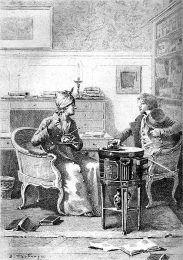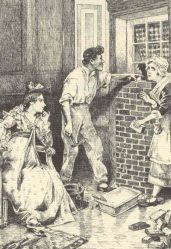
The Commission in Lunacy
THE HUMAN COMEDY – Honoré de Balzac We find this novel in the tenth volume of works of Honoré de Balzac edited by widow André Houssiaux, publisher Hebert & Co, successors, 7 rue Perronet – Paris (1877), classified in this edition of the time under scenes of Parisian life. By naming Scenes of Parisian life a number of short stories that had previously appeared under the heading Scenes of Private life, Balzac shows here one of the transfer models he used in his working methods.
Scenes from private life 

THE COMMISSION IN LUNACY
Dedicated to Rear-Admiral Bazoche, Governor of Ile Bourbon. by the grateful author, De Balzac .
The Story L’Interdiction is less well known than Le Colonel Chabert, and less dramatic, but it is one of Balzac’s most sober and touching short stories. Old Judge Popinot, renowned for his kindness, benevolence and integrity, a learned and perceptive jurist, is approached by his nephew, Doctor Horace Bianchon, on behalf of one of his clients, the Marquise d’Espard. She is asking the court to issue a restraining order against her estranged husband. Judge Popinot has just been instructed by the court to examine this request, an exceptional and often suspect procedural act by which the husband is deprived of the right to manage his fortune, in the interests of his family and children. The Marquise criticizes her husband for inexplicably squandering a large part of the family patrimony on a Dame Jeanrenaud and her son, who appear to have no right to this largesse. The short story consists of two scenes that provide the key to the mystery. The first scene is simple and striking. It takes place in a salon in the Faubourg Saint-Germain. The Marquis d’Espard is a very old and noble family. The old judge looks like a fool. He respectfully asks a few timid, almost clumsy questions (out of strategy). We pity his gaucherie. Then, suddenly, he makes an objection that shows he’s understood everything, that he’s not fooled: it’s the Marquise who, in reality, needs her husband’s fortune and her children to ensure the luxury she needs. Those present were dismayed: the trial was lost. The second scene takes us to rue de la Montagne Sainte-Geneviève, close to Père Goriot‘s Pension Vauquer. The Marquis d’Espard has rented an old mansion here, in which he has settled with his two young sons, and one floor of which he uses to store the volumes of a major work he is writing on China, which he is passionate about. He leads a discreet life and is not linked to anyone. He’s known in the neighborhood as a half-crazed old original. The judge questions him in turn. The Marquis d’Espard tells him the secret of his life. On examining his family’s title deeds, which were returned to him at the start of the Restoration, he found that a large part of his estate came from a confiscation pronounced against a Protestant family during the revocation of the Edict of Nantes. This family was fraudulently prevented from lodging a valid opposition, and the father who wanted to oppose the ruin of his children was hanged. The marquis tracked down this family, and found its ruined and impoverished descendants. He considered it a duty of conscience and probity, as the only moral legitimization of his title and nobility, to return the property acquired through this spoliation. His wife knew everything: she refused to take part in the restitution. The judge’s mind is made up. He will oppose the ban. A cold that kept him ill at home delayed his decision by a day. When he arrived at the Palais to submit his report, he was informed that the Marquise d’Espard had obtained his dismissal and that another magistrate had been appointed in his place. The moral is bitter. In L’Interdiction, as in Le Colonel Chabert, those with noble feelings, who are trusting, generous and selfless, are life’s losers. Père Goriot is another example of this pessimism. The winners are those who are hard-hearted and ruthless, and who only want to experience what will later be called “the fight for life”. This cynicism is all the more horrifying in that it is represented in both cases not by unscrupulous ambitious men, but by seemingly gentle, languid, helpless creatures. These “comédiennes de salon”, as Balzac would later say, are perfectly described in the portrait of the Marquise d’Espard. It’s a type of woman that had long interested Balzac. He made her a myth in his first novel, La peau de chagrin, as “the heartless woman”. This character was portrayed several times by Balzac between 1832 and 1835: in Le Contrat de mariage, in particular. Madame d’Espard’s portrait reveals the secrets behind these seemingly enviable lives: the only way to maintain one’s position at the pinnacle of worldly success is through a strict regimen of privation and discipline. In a pastiche of Balzac, Marcel Proust called them “the Carmelites of worldly success”. Paris, February 1836
Preface collected (Tome VI) from the complete works of the Comédie Humaine published by France Loisirs 1985 under the auspices of the Société des Amis d’Honoré de Balzac.
The characters Le juge Popinot: (Jean-Jules) Magistrate who marries a Bianchon. A character of probity, intelligence and clear-sightedness. Not being a schemer or an upstart, he was not admitted to the Court. Despite his excellent skills, he found himself demoted to the bottom rung by the intrigues of those in power. He was reduced to deputy judge. This injustice struck the judicial world. After 12 years as a deputy judge, Mr. Popinot ended his career as an ordinary judge at the Tribunal de la Seine. La marquise d’Espard: Madame Jeanne-Clémentine-Athénaïs de Blamont-Chauvry, separated from the marquis d’Espard, landowner living at rue du Faubourg Saint-Honoré, no. 104 with Desroches as solicitor. Mother of two sons living at the home of her father, Monsieur le Marquis d’Espard. A socialite living in excessive luxury. The Marquis d’Espard : Monsieur Charles-Maurice-Marie Andoche, comte de Négrepelisse, marquis d’Espard (good nobility), landowner living at no.22 de la Montagne Sainte-Geneviève (near the Pension Vauquer). Maître Desroches: A solicitor, a small-time businessman, disliked by the court and his colleagues, who harms his clients.
Source additional notes: Wikipedia
No Comments